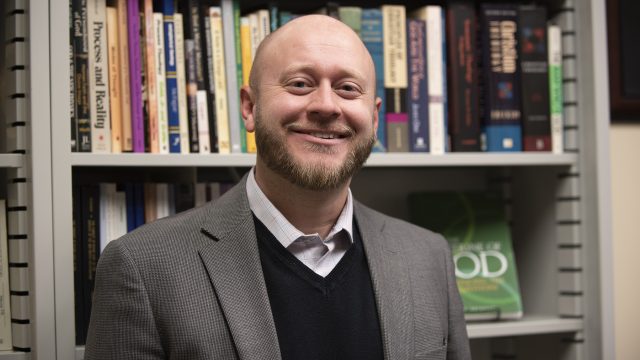Despite its widespread availability, the Bible is perhaps one of the least read and most besieged books of this age.

The man had been dead and buried for more than 40 years. Then, one gray day the peace was broken in a church graveyard in Lutterworth, England, as a strange group approached a certain plot with shovels in their hands. Gathering around the grave, clergymen ordered the diggers to exhume the remains of John Wycliffe, a much-loved priest and highly esteemed Oxford scholar who had died on December 31, 1384. Wycliffe’s exhumed bones were then burned and the ashes scattered in the river Swift.
What had he done to deserve such a fate? Why was the Church of Rome so intent on ridding the earth of his remains? John Wycliffe had dared to speak the truth and provide the Word of God to people in their native tongue.
A century before the birth of Martin Luther, Wycliffe proclaimed, “Trust wholly in Christ; rely altogether on his sufferings; beware of seeking to be justified in any other way than by his righteousness.”1
Power of Scripture
Wycliffe knew the power of Scripture and was determined to provide it in the common language, rather than in Latin only—the language of the learned. While facing fierce opposition, he carried forward this important work, explaining that “Englishmen learn Christ’s law best in English. Moses heard God’s law in his own tongue; so did Christ’s apostles.”2
The Wycliffe Bible had a profound influence as it gave thousands direct access to God’s Word. In the classic Foxe’s Book of Martyrs, John Foxe wrote: “Though they digged up his [Wycliffe’s] body, burnt his bones, and drowned his ashes, yet the Word of God and the truth of his doctrine, with the fruit and success thereof, they could not burn; which yet to this day . . . doth remain.”3
The Tyndale Bible
William Tyndale, a gifted Oxford and Cambridge scholar who was fluent in eight languages, is perhaps the most well-known Bible translator and martyr. Living in sixteenth-century England, Tyndale was familiar with Wycliffe’s Bible. Although it was still banned, manuscript copies were available on the black market, but they were expensive and hard to find.
Printing was becoming more common by the mid-1500s, so Tyndale decided the time was right for an updated English translation that would be accessible to more people. Tyndale translated from original Greek and Hebrew texts, rather than Latin, as Wycliffe had done.
Because of the religious climate in England, Tyndale traveled to Germany, where the Reformation was well under way and Martin Luther had completed a German translation of the Scriptures.
Tyndale worked quickly, and by 1525 copies of his New Testament were smuggled into England. Religious leaders were furious that they could not stop the spread of God’s Word. Meanwhile, Tyndale worked on translating the Old Testament while still living on the European continent. He translated and published roughly half of the Old Testament before he was betrayed by a fellow Englishman.
William Tyndale was imprisoned for more than 500 days in a castle near Brussels before he was removed from its dungeon in October 1536, tied to a stake in the castle courtyard, then strangled with a thick chain before his body was burned.
John Hus, a Czech priest, was another such translator and martyr.4 Others suffered a similar fate.
What was so precious about Scripture that they, and thousands more, were willing to suffer and die? Is God’s Word as important to us today?
The Bible is now widely available. It has the distinction of being the bestseller of all time. It is the most translated book in the world. Various individual books of Scripture have been translated into 2,932 different languages. The entire New Testament is available in 1,333 languages. The complete Bible has been translated into 553 languages.5
Most Besieged Book
Despite its widespread availability, the Bible is perhaps one of the least read and most besieged books of this age. While persecution for owning a Bible still occurs in some places, in much of the world, attacks on Scripture come more subtly.
One of the most pernicious attacks comes through the historical-critical method of Bible study. In this method readers decide what is and what is not important, what is trustworthy, and what can be set aside. Readers put themselves above Scripture.
Another subtle attack is the insinuation that one needs to be a scholar or theologian to understand the Bible; otherwise one can obtain only a “surface reading” of the text. This reasoning harkens back to the Roman Catholic Church which claimed that only scholars of the church are capable of interpreting Scripture.
God, on the other hand, promised in His Word, “If any of you lacks wisdom, let him ask of God, who gives to all liberally and without reproach, and it will be given to him. But let him ask in faith, with no doubting, for he who doubts is like a wave of the sea driven and tossed by the wind” (James 1:5, 6).
Why are the Scriptures so important? Let’s briefly look at three of the many reasons:
The Bible Reveals God.
“In the beginning was the Word, and the Word was with God, and the Word was God” (John 1:1). Through God’s Word we learn about Him. It shows how God deals with the problem of sin, and how He longs to reconcile us to Himself. It reveals His creativity, His majesty, His mercy, His justice, and His plans. “Surely the Lord God does nothing, unless He revealeth his secret unto his servants the prophets” (Amos 3:7).
Our first Fundamental Belief states: “The Holy Scriptures, Old and New Testaments, are the written Word of God, given by divine inspiration. The inspired authors spoke and wrote as they were moved by the Holy Spirit. In this Word, God has committed to humanity the knowledge necessary for salvation. The Holy Scriptures are the supreme, authoritative, and infallible revelation of His will. They are the standard of character, the test of experience, the definite revealer of doctrines, and the trustworthy record of God’s acts in history.”6
God’s Word Is Truth.
“I am the way, the truth, and the life,” said Jesus (John 14:6). In His prayer to His Father recorded in John 17, Jesus prayed, “Sanctify them by Your truth. Your word is truth” (verse 17).
When Jesus was confronted by religious leaders who were angry because He claimed to be the Son of God, Jesus went to Scripture for authority. “The Father Himself, who sent Me, has testified of Me,” Jesus told them. “But you do not have His word abiding in you. . . . Do not think that I shall accuse you to the Father; there is one who accuses you—Moses, in whom you trust. For if you believed Moses, you would believe Me; for he wrote about Me” (John 5:37-45).
Scripture, Jesus affirms, testifies of Him. They reveal God’s divine purposes and plans, and explain how sin entered the world. They reveal God’s response to sin and His relationship with human beings, and give insight into the character and nature of God.
The Scriptures Are Instructive
“The Bible is the most comprehensive and the most instructive history which men possess,” wrote Ellen White. “It [the Bible] came fresh from the fountain of eternal truth, and a divine hand has preserved its purity through all the ages. Its bright rays shine into the far distant past, where human research seeks vainly to penetrate. In God’s Word alone we find an account of creation. Here we behold the power that laid the foundation of the earth, and that stretched out the heavens. Here, only, can we find a history of our race, unsullied by human prejudice or human pride.”7
The Bible, like Jesus, rises above culture, prejudice, and pride. It reveals to us the truth about ourselves, about our world, and beyond. It teaches us how to have a genuine relationship with God and with each other, and gives us powerful promises that we may live a consistent spiritual life.
“A great work can be done by presenting to the people the Bible just as it reads,” wrote Ellen White. “Admonish them to take the Bible as it is, to implore divine enlightenment, and then, when the light shines, to gladly accept each precious ray, and fearlessly abide the consequences.”8
Scripture Our Safeguard
While on earth, the subject of Christ’s teaching and preaching was the Word of God. We are told, “Christ’s servants are to do the same work. In our day, as of old, the vital truths of God’s Word are set aside for human theories and speculations. Many professed ministers of the gospel do not accept the whole Bible as the inspired Word . . . . They set up their judgment as superior to the Word; and the Scripture which they do teach rests upon their own authority. Its divine authenticity is destroyed. Thus the seeds of infidelity are sown broadcast; for the people become confused and know not what to believe.
“[Christ] taught that the Word of God was to be understood by all. He pointed to the Scriptures as of unquestionable authority, and we should do the same. The Bible is to be presented as the Word of the infinite God, as the end of all controversy and the foundation of all faith.”9
As we remember the faithful martyrs—those who were willing to sacrifice self rather than Scripture—let us treasure, teach, and preach the mighty, living Word of God until Jesus comes, and be able to say with David, “Thy word have I hid in mine heart, that I might not sin against thee” (Ps. 119:11).
Suggestions for Prayer:
- Ask God to give you, personally, a greater appreciation for, and dedication to, God’s Word.
- Ask God to bless those who “break the bread of life” to your community of faith with understanding.
- Pray for those, worldwide, who may not have the privilege of access to Scripture because of scarcity or persecution.
1 “John Wycliffe, Pre-Reformation Reformer,” Christian History, Christianity Today, www.christianitytoday.com/history/people/moversandshakers/john-wycliffe.html
2 Ibid.
3 Ibid.
4 Emma Mason, “The murderous history of Bible translations,” BBC History Magazine, www.historyextra.com/article/feature/murderous-history-bible-translations; “John Huss, Pre-Reformation Reformer,” Christian History, Christianity Today, www.christianitytoday.com/history/people/martyrs/john-huss.html
5 Statistics from Wycliffe Global Alliance, Oct. 2015, cited in Biblica, International Bible Society, www.biblica.com/resources/bible-faqs/how-many-different-languages-has-the-bible-been-translated-into/
6 28 Fundamental Beliefs, 2015 edition, Seventh-day Adventist Church, szu.adventist.org/wp-content/uploads/2016/04/28_Beliefs.pdf.
7 Ellen G. White, Christian Education, p. 37.
8 White, Christian Service, p. 144.
9 White, Christ’s Object Lessons, pp. 38, 39.








